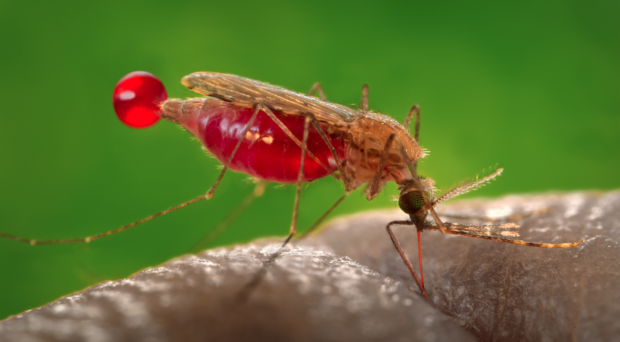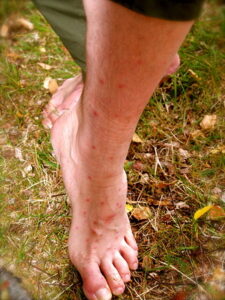
Have you ever noticed, when mosquito season rolls around again, how some people are practically mosquito-magnets while others seem to get off relatively bite-free? This is something that scientists have been pondering as well, especially as mosquitoes can be more than a simple annoyance; in many parts of the world mosquitoes spread deadly diseases such as malaria. Malaria is spread through the bite of an infected female mosquito from the genus Anopheles and in 2021 there were an estimated 247 million malaria cases worldwide where 619,000 people died.
There are several sensory cues mosquitoes can use to navigate towards their next meal, such as body heat and the shape and movement of potential hosts. Scent is a particularly important way for them to locate their target, with odorants such as CO2 from their host’s breath found to be detectable to other blood-feeding arthropods from around 60 metres away.
The question is: in a larger and more natural setting, what sort of scents do we produce that lure these mosquitoes towards us, and are there any that could even be a turn-off?
Building a mosquito buffet
Instead of studying mosquitoes in a lab setting using a small wind tunnel (a method typically used when studying the scent preferences of mosquitoes), researchers from Johns Hopkins University and the Macha Research Trust constructed an enormous 20 by 20 metre screened flight cage with a volume of a thousand cubic metres in Zambia. Buzzing freely within this structure were hungry Anopheles gambiae mosquitoes. These bloodsuckers prefer to dine around midnight and are anthropophilic: they have a preference for human blood.
Eight one-person tents were erected around the structure, each containing a single sleeping beauty. Their scent was fanned through a long duct tube into the flight cage and onto an aluminium disc heated to the average human body temperature of 37℃. In total, six sleeping humans were arranged around the cage in this manner, with each having their own unique cocktail of smells wafting onto six dishes for the bloodsucking diners to sample in what could arguably be the first smorgasbord designed for mosquitoes. Over six nights mosquito behaviour was observed using infra-red cameras focused on each of the six plates. While all the dishes of human odour generated interest from the mosquito dinner guests, the researchers discovered that one dish in particular received rave reviews while another appeared unpalatable. The next question to answer was why.

What aromas make one a mosquito-magnet?
Air samples from each of the six tents were analysed to produce a chemical profile for each of the human participants’ individual bouquet of aromas. A total of forty volatile organic compounds were detected, fifteen of which controlled a person’s attractiveness to mosquitoes.
The most delectable participant, having the most total mosquito landings on four of the six nights, had higher levels of carboxylic acids in their chemical scent profile compared to the others. Such human body odours are produced by 1) the sebaceous glands that help to hydrate and protect our skin and 2) the person’s natural skin bacterial flora. A higher concentration of the skin microbe-generated scent, methyl-ketone acetoin, was also found in the scent profile of this highly attractive individual. In contrast, the participant receiving the lowest rating (i.e., having the least total landings on four of the six nights), had a lower level of carboxylic acids in their odour profile alongside a threefold increase in eucalyptol. What is eucalyptol? It is a known mosquito repellent!
As the name suggests, not only is eucalyptol present at high concentrations in eucalyptus oil, but it is also found in many other plants such as rosemary and sage. It is often used as a food flavouring and can be present in some non-food products such as beauty creams and mouthwash. One reason for the high level of eucalyptol detected in the participant’s odour profile could be linked to the plant-based diet of this individual. Vegans (and koalas) rejoice!
The big question of course is how could these interesting findings contribute to malaria control? Future research directions could use this semi-field testing methodology to identify more variations in human odour profiles linked to the skin microbiome, diet, pregnancy status or malaria infection status. Understanding mosquito olfaction and what scents control their behaviours could potentially help predict those individuals at a higher risk for malaria infection.
Furthermore, a greater understanding of the refined mosquito palate could help create better repellents to truly put them off their dinner for good.
In conclusion, maybe we should all remember to eat our veggies, infuse your bath with rosemary and use some mouthwash as it may just increase your chances of repelling mosquitoes (and in the case of the latter, may attract some humans as well!).

Comments